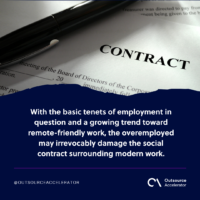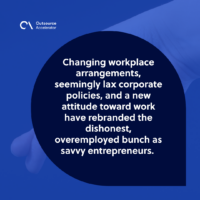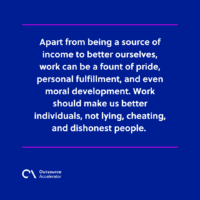A breakdown of the commercial contract
The trending scourge of juggling multiple jobs is rising in popularity amongst the disenfranchised professional class, leaving employers out of pocket and exposed. The offenders, known as the ‘overemployed,’ are building a criminal business network that views work as a purely money-grabbing opportunity instead of a pursuit characterized by integrity and the development of ethical values.
With the basic tenets of employment in question and a growing trend toward remote-friendly work, the overemployed may irrevocably damage the social contract surrounding modern work.
An IT quality assurance professional has admitted to juggling six full-time jobs and is outsourcing other people to accomplish most of the work. The Gen Xer spends his work days reviewing his team’s output. One of his employees is his brother-in-law, who helps with the clandestine operations and stands in for virtual meetings.
The anonymous IT staffer aims to continue violating company policies to reach his goal of netting $800,000 this year. He’s confident his employers are unaware of his antics. He’s also oblivious to whether his unethical gig is disrupting his employers’ workflows or if his output is adequate or subpar.
Popular online forums have praised this new trend, calling it a lucrative venture. Changing workplace arrangements, seemingly lax corporate policies, and a new attitude toward work have rebranded the dishonest, overemployed bunch as savvy entrepreneurs.
However, the true entrepreneurial spirit involves honoring contracts, following ethical conduct, and manifesting virtues. A company pays its staff for their work and for upholding its privacy and intellectual property rights. Exposing it to third parties is a clear violation of this commercial contract and could lead to serious consequences such as data breaches and identity theft.
Why do we work?
The overemployed don’t always engage in fraudulent behavior. There are a number of honest hustlers who accomplish their full-time responsibilities on weekdays and dabble in part-time work in the evenings or weekends.
In cases when their work falls under the same discipline, they ensure there are no conflicts of interest between the businesses they work for. These professionals also take great caution not to disclose any sensitive information about their employers.
The old breed of overemployed professionals are inspired by a passion for other pursuits and a need for another income source. Meanwhile, the new class of entitled workers are motivated by greed and have devalued the meaning of work.
Work is not merely a means to an end. It’s an exercise of our intellect and capabilities as members of society. Apart from being a source of income to better ourselves, work can be a fount of pride, personal fulfillment, and even moral development. Work should make us better individuals, not lying, cheating, and dishonest people.
Reining it in
To an extent, businesses are also responsible for this unfortunate development. In their quest to boost their profits and improve their market position, firms have solely focused on meeting targets and deadlines and not the career progress of the individuals behind them.
Corporations should make their employees feel they’re not merely machines churning out deliverables day in and day out but people who value communication and crave career advancement.
Regular meetings that revolve around work progress and the staff’s work and personal goals are an effective way to forge transparency and trust. Mouse jigglers, screen monitoring software, and other related tools are draconian methods to measure progress and employee honesty.
There’s no substitute for clear communication lines and constant reinforcement of the commercial contract between staff and the business.
The question for your business
How do you know if your remote workers are working?




 Independent
Independent





















